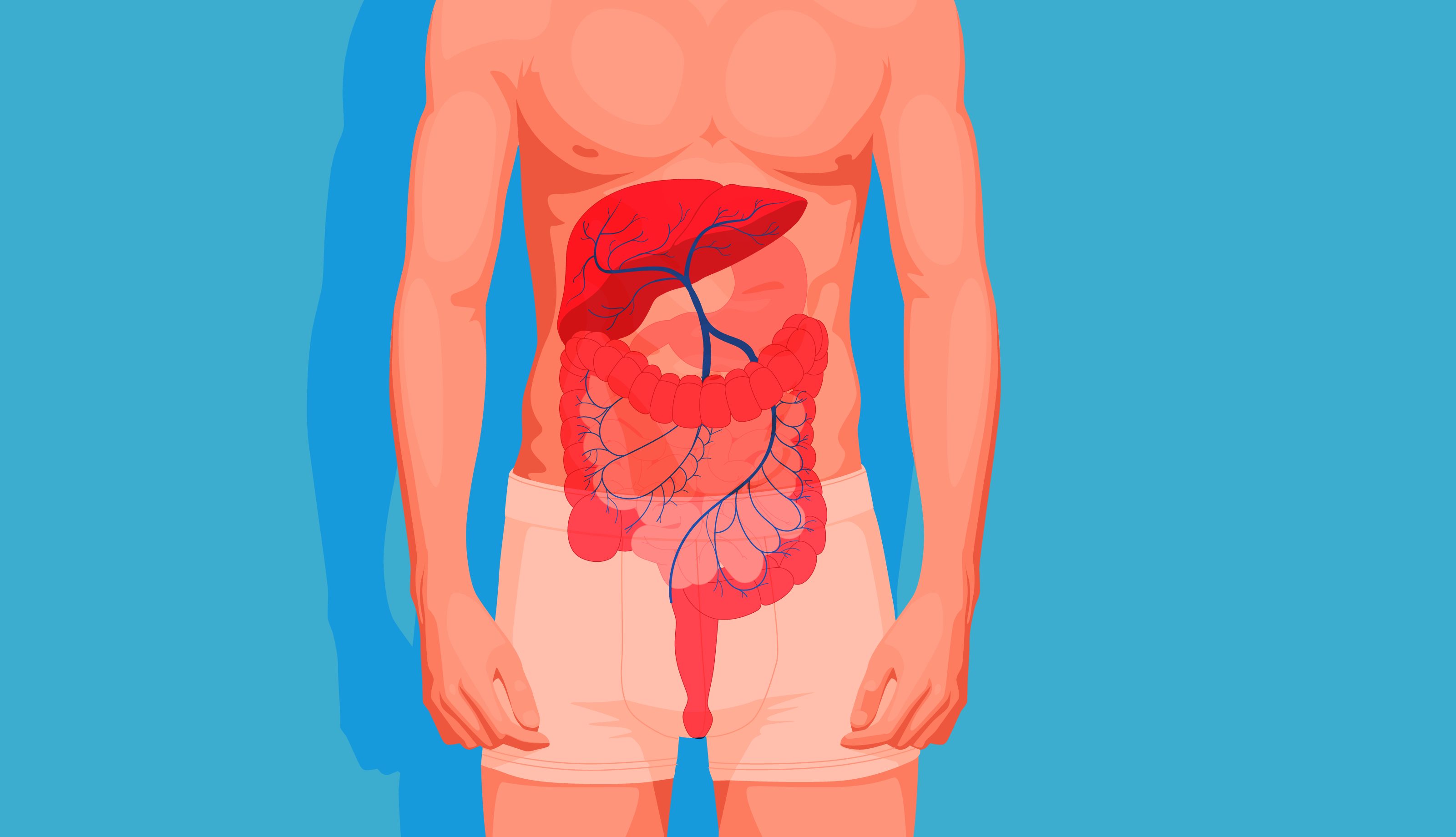For Dry January, we are putting a spotlight on alcohol & gut health. Read on to discover how excessive drinking impacts digestive health and the microbiome.
After a month of festive excess and one too many toasts, Dry January is upon us. There are many documented health benefits associated with this, ranging from improved sleep to reduced cholesterol, but as gut specialists, we are going to explore how alcohol affects digestive health. Grab a kombucha and settle down because this is the lowdown on how alcohol impacts gut health.
Table of contents:
- The gut-liver axis
- Alcohol abuse & gut health
- Red red wine, you make me feel so fine
- Top tips
- Takeaway
The gut-liver axis
Alcohol is absorbed in the upper intestinal tract and then transported to the liver via the portal vein. The gut and the liver communicate bi-directionally via this communication network, something known as the gut-liver axis.
Alcohol abuse can disrupt the gut-liver axis at multiple points and has been associated with the development of liver disease. To date, much of this research has been on rodents, with ethical concerns largely explaining the lack of quality human studies.
Alcohol abuse & gut health
We currently have no substantial studies on how light to moderate alcohol use affects the gut. Still, we do have studies looking at how chronic alcohol use alters the microbiome and digestive health of those with alcohol dependency.
In excess, alcohol has been shown to reduce microbial diversity in the microbiome, increase the permeability of the gut lining and trigger inflammation in the body. These disruptions to the gut-liver axis are associated with cirrhosis and alcoholic hepatitis.
With that being said, drinking red wine in moderation might increase microbial diversity due to its polyphenol content, a micronutrient that feeds beneficial bacteria. Let’s take a closer look:
☝IMPORTANT☝ For those with alcohol dependency, it can be dangerous to stop drinking cold-turkey. If you are a heavy drinker and want to quit, consult a trained medical professional or a facility that specializes in alcohol and drug treatment.
Increased intestinal permeability and inflammation
Excessive alcohol consumption can cause inflammation in the gut, thereby increasing intestinal permeability (IP). In one study, it was shown that those with Alcohol Use Disorder (AUD) have increased IP meaning the tight junctions cells in the gut wall are loosened. As a result, endotoxins and bacteria can escape through the gut lining into the bloodstream. These molecules trigger an immune response and prompt the body to release pro-inflammatory cytokines.
Over time, low-grade chronic inflammation can increase a person’s chances of developing multiple diseases, including coronary heart disease and certain cancers. What’s more, IP as a result of alcohol abuse has been linked with increased depression, anxiety, and increased cravings in those with AUD.
Moreover, those with AUD and increased IP are at an increased risk of liver disease, suggesting that IP plays a part in organ failure among those abusing alcohol. Drinking to excess can also affect your biological clock, known as the circadian rhythm. Over time, this can increase IP and, by extension, low-grade inflammation.
Although IP clearly plays a role in the development of alcohol-related liver disease, only a subset of those with alcohol dependence develop a leaky gut as it is colloquially known. As such, there are clearly other factors at play that influence the development of endotoxemia and organ failure.
☝Did You Know☝ The bacteria in your gut microbiome helps you metabolise alcohol. This is one of the many reasons why we all tolerate alcohol differently.
Reduced diversity
Another factor that appears to play a role in the development of liver disease is alcohol-related dysbiosis. In short, chronic alcohol consumption may also reduce microbial diversity and deplete beneficial bacteria. An imbalance in the intestinal microbiome is associated with a range of disorders, including:
- anxiety
- depression
- obesity
- inflammatory diseases.
- chronic fatigue
In one study, dysbiosis was shown to be associated with IP, especially when bacteria from the Ruminococcaceae families were lacking. As we have discussed, IP can lead to inflammation throughout the body, influencing both mood and digestion. Although there is a serious lack of human studies, dysbiosis in the microbiome appears to be related to the development of alcohol-related liver disease also.
Increased likelihood of developing SIBO
Excessive alcohol consumption has been shown to increase an individual's risk of developing Small Intestinal Bacterial Overgrowth (SIBO). This is a condition where there is an increase in the population of bacteria which colonise the small intestine. This disorder can manifest itself through digestive issues such as bloating, abdominal pain, constipation and diarrhoea.
A study from the American College Of Gastroenterology found that even moderate alcohol consumption increases your risk of developing SIBO. It is theorised that this is because alcohol can affect motility in the gut, the process whereby the small intestine moves food through wave-like muscle contractions.
Chronic drinking can also cause digestive issues by reducing the amount of enzymes and juices the body produces. This can hinder digestion and lead to a range of symptoms, including:
- bloating
- loose stools
- gas
The drunk munchies
When we drink, our inhibitions are lowered and our judgement is impaired. Most of us are well aware of this and have questionable texts and embarrassing videos as proof! Whilst enjoyable, this lack of inhibition can also lead to poor health choices. For example, drinking can increase cravings to smoke and eat junk food, both of which wreak havoc on our gut bacteria.
In a revelation that will surprise absolutely nobody, one study found that inebriated individuals are more likely to opt for processed fast foods like pizza and burgers than vegetables or fruit. Even the day after drinking, participants were more likely to indulge in fast-food options.
These foods are high in fats, refined sugars and salt, all of which are common to what researchers call a Western diet. In multiple studies, this has been associated with dysbiosis and numerous chronic illnesses. Whilst the odd takeaway will not do any harm, frequent and excessive drinking can lead to poor dietary choices.
Red Red wine, you make me feel so fine

Red wine is rich in polyphenols, a type of micronutrient that naturally occurs in some plants. Not only have these been shown to have antioxidant and anti-inflammatory properties, but they are potentially prebiotic also, meaning they feed beneficial bacteria in the gut microbiome.
In a 2020 study at Kings College London, 914 female twins were split into groups and given red wine, white wine, beer, cider and spirits (sounds like my kind of study!). At the end of the study, those who drank red wine had increased microbiome diversity compared to the non-red wine drinkers. Before you grab a bottle of wine and start glugging, just one glass a week proved sufficient to see benefits. The researchers cautioned that drinking over the recommended guidelines will likely undermine any health benefits that red wine might confer.
In another study, the same authors observed increased diversity in red wine drinkers across three cohorts and over 3000 individuals. This further supports the prebiotic effect of red wine due to the polyphenols in grape skin.
Don’t worry if you don’t like drinking as polyphenol levels are equally high in non-alcoholic red wine. Better still, dark chocolate and tea both have high levels of these beneficial micronutrients, especially chocolate with an 80%+ cocoa content and loose green tea.
Top Tips For Drinking Sensibly
Much of the research we have covered has focused on the effect of alcohol abuse, something which is undeniably damaging to the gut. With that being said, in moderation alcohol can play a part in a healthy and balanced lifestyle. Below are a few guidelines you can follow to look after both your digestive health and overall wellbeing.
First and foremost, try not to exceed more than fourteen units each week; that is about five glasses of 13% wine or eight bottles of 5% beer. For men, drinking over eight units in one session is considered binge drinking, whilst for women, it is over six units. If you exceed this on special occasions from time to time, you’ll likely be fine, though it is best to remain within the recommended guidelines. The independant charity Drinkaware aware have a calculator for units and calories when you are drinking.
It is always a good idea to alternate between a glass of water and an alcoholic drink to ensure you stay hydrated. On this topic, don’t quench your thirst with alcoholic beverages; instead, make sure you are hydrated before drinking. Lastly, be mindful of your food choices the day after drinking and choose foods that will nourish your gut.
☝TIP☝ If you suffer from IBS, try to keep your alcohol intake to a minimum as it can exacerbate symptoms like diarrhoea and abdominal cramps.
Takeaway
-
There is a dearth of studies looking at how light to moderate drinking affects gut health
-
The majority of research looks at those with alcohol dependency
-
Alcohol abuse can induce dysbiosis, increase intestinal permeability and trigger inflammation in the body
-
Chronic drinking can also cause digestive issues by reducing the amount of enzymes and juices the body produces
-
Alcohol can lower our inhibitions and lead to poor health choices, whether that be smoking or eating junk food.
-
Red wine might be able to increase diversity, though if you drink beyond the health guidelines, the benefits are outweighed by the harm of bingeing.
☝️DISCLAIMER☝This article is for informational purposes only. It is not intended to constitute or be a substitute for professional medical advice, diagnosis, or treatment.
















